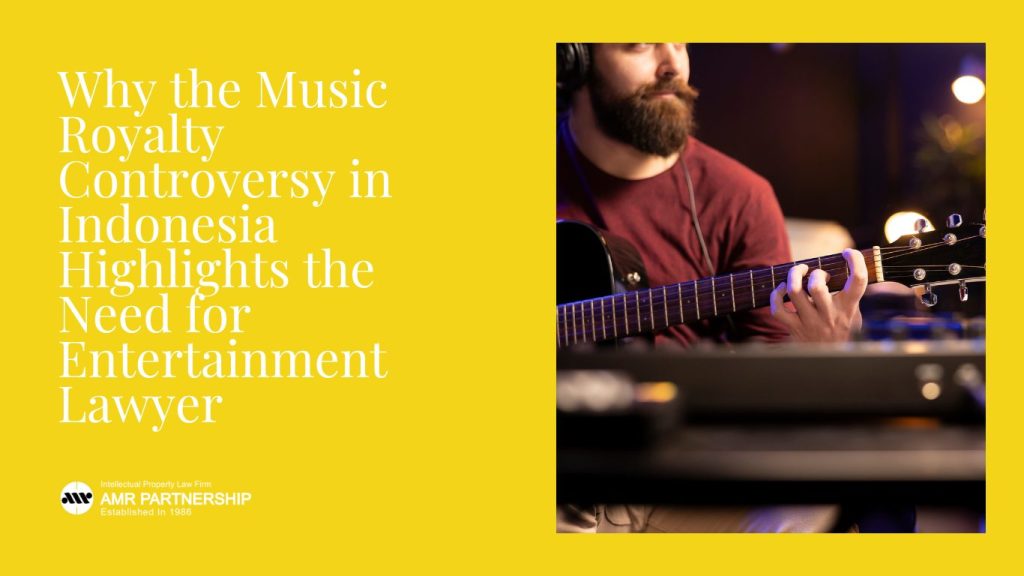
The ongoing debate around music royalties in Indonesia has sparked widespread discussion across industries. At the heart of the issue is a simple but pressing question about who should pay when music is played in public spaces. This growing tension shows why an entertainment lawyer is crucial today, helping both businesses and creators navigate these complex obligations fairly.
This tension highlights the importance of having legal professionals who understand the entertainment industry. An entertainment lawyer can help clarify obligations, interpret regulations, and ensure that both creators and businesses navigate this complex field lawfully. As the rules evolve and enforcement becomes stricter, the role of such lawyers becomes even more crucial, especially for those who want to avoid costly disputes. For those seeking guidance, expert support is available at amr.co.id.
READ MORE: Understanding Employer Liability and the Role of a Copyright Infringement Lawyer
Understanding Music Royalties in Indonesia
Music royalties represent the payment made to creators when their work is used commercially. Globally, royalties are divided into several categories:
Performing rights refer to the compensation that creators receive when their songs are played in public spaces or broadcast on media.
Mechanical rights cover royalties earned whenever a song is reproduced, such as through CDs, vinyl, or digital downloads.
Streaming rights are the payments generated from digital platforms that provide on-demand access to music libraries.
Public performance rights apply when music is used in venues like restaurants, cafés, hotels, or shopping malls.
In Indonesia, these royalties are governed by the Copyright Law. The law emphasizes that creators hold both moral and economic rights. Moral rights ensure recognition of authorship, while economic rights allow creators to profit when their works are used. Importantly, the regulation makes a distinction between personal use and commercial use. For instance, playing music at home for private enjoyment does not generate royalties, but broadcasting it in a café does.
Several cases illustrate this distinction. Restaurants playing background music are subject to royalty fees. Hotels hosting live bands must also contribute. Even transportation operators who provide music to passengers are expected to comply. Online media outlets streaming songs also need to follow regulations. These examples show that royalty obligations are not limited to entertainment venues but extend across multiple sectors.
By understanding these fundamentals, businesses and artists can better prepare for compliance. However, because the law is detailed and sometimes ambiguous, consultation with a professional remains essential.
READ MORE: How IP Lawyer Help Businesses Tackle Ghost Piracy in Southeast Asia
Who Should Really Pay for Music Royalties in Today’s Debate
The central controversy in Indonesia revolves around determining who is legally and ethically responsible for royalty payments. Government agencies and collective management organizations argue that businesses benefiting from music must contribute financially. Musicians echo this view, stressing that royalties are not merely fees but recognition of their creative labor.
Business owners, however, often see matters differently. Many believe that playing music promotes artists, making payments unnecessary. Others argue that royalty fees place a heavy financial burden on smaller enterprises. Cafés and local shops are especially vocal about the impact, claiming that compliance could threaten their operations.
This debate extends to public spaces. Should transportation operators or community centers be liable for royalties? Event organizers are another group caught in the crossfire, as they rely heavily on music but often face unclear guidelines on reporting and payments.
Academics and legal experts emphasize that the root problem lies in enforcement and transparency. Without clear rules and accessible systems, both businesses and creators suffer. For businesses, the lack of clarity increases costs and risks of penalties. For creators, uncertainty undermines their ability to benefit from their work.
This clash underscores the importance of proper legal guidance. Without professional help, businesses may unintentionally violate rules, while creators may fail to protect their rights. An entertainment lawyer bridges this gap by providing clarity and negotiating solutions that respect both sides.
READ MORE: Finding the Right Copyright Infringement Lawyer Near You for Digital Content Protection
Why Entertainment Lawyer Are Essential in Royalty Issues
In the global entertainment industry, lawyers play a pivotal role in ensuring that rights are protected and obligations are met. An entertainment lawyer is a legal professional specializing in the creative sectors, including music, film, and media. Their expertise extends to drafting contracts, negotiating licenses, safeguarding intellectual property, and resolving disputes.
When it comes to royalties, their role becomes indispensable. Here’s how they contribute:
Contract negotiation helps ensure that artists receive fair terms whenever they license their work to businesses or streaming platforms.
Compliance advice provides businesses with clear guidance on which royalty obligations apply and how to meet them properly.
Dispute resolution gives clients legal representation in mediation or court when conflicts arise, safeguarding both their finances and reputation.
Rights protection allows artists to secure their ownership and prevent misuse or unauthorized changes to their music.
Global cases illustrate their importance. Major artists like Taylor Swift have relied on legal teams to reclaim control over their music catalogs. Disputes over song ownership or royalties often become high-profile, showing how complex the industry has become. These examples reveal that without professional legal assistance, even established musicians can lose control of their work.
For businesses, hiring an entertainment lawyer reduces risks of penalties or reputational damage. It also helps them build sustainable partnerships with artists and organizations. In a climate where laws evolve rapidly, legal expertise ensures both sides are treated fairly.
READ MORE: What the “Nuansa Bening” Case Can Teach You About the Role of a Copyright Infringement Lawyer
The Challenges for Artists and Businesses in Indonesia
Indonesia’s music industry faces unique hurdles. Independent artists often struggle to understand the royalty system, leaving them vulnerable to unfair treatment. Many lack the resources to track how often their songs are played or to ensure they receive fair compensation.
On the other hand, small businesses argue that royalty systems are burdensome. Cafés, small restaurants, and local venues often work with limited budgets. The additional expense of paying royalties can feel overwhelming. This tension sometimes fuels resentment, creating resistance toward compliance.
Another significant issue is transparency. Collective management organizations tasked with collecting and distributing royalties have faced criticism over unclear processes. Artists question whether royalties are distributed fairly, while businesses demand greater accountability. Without reliable reporting, trust erodes, leaving all parties dissatisfied.
This is where professional legal assistance becomes vital. An entertainment lawyer can act as a mediator, ensuring that both creators and users of music are treated fairly. They can review contracts, oversee reporting obligations, and press for greater transparency from organizations. Their expertise helps prevent exploitation, creating a more balanced system.
For those who feel caught between unclear rules and financial constraints, turning to professional legal services is a practical step. With expert advice, artists secure their rights, and businesses gain clarity. Legal professionals can transform what appears to be a burden into a structured and manageable responsibility.
READ MORE: How Copyright IP Law Services in Indonesia Support Media and Entertainment Industries
Practical Steps on How an Entertainment Lawyer Can Help You
For both artists and businesses, working with an entertainment lawyer offers practical advantages. Their services go beyond theory and directly impact daily operations. Here are some concrete ways they can assist:
Legal audit involves carefully reviewing contracts, royalty statements, and compliance processes to make sure every legal obligation is properly fulfilled.
Negotiation support means guiding discussions between artists, record labels, and businesses so agreements are fair and mutually beneficial.
Litigation support comes into play when disputes arise, with lawyers representing clients in court or through alternative dispute resolution.
Education and training focus on helping creators and companies understand their rights and duties, empowering them to avoid legal pitfalls.
By offering these services, lawyers bring stability to an otherwise confusing environment. Artists gain confidence that their rights are respected, while businesses gain security knowing they comply with regulations. For both sides, this partnership reduces conflict and fosters mutual respect.
In Indonesia, where the music industry is rapidly growing, the demand for such services is expected to rise. Those who engage legal professionals early gain a competitive advantage. To explore how this support can benefit you, visit amr.co.id and learn more about tailored solutions for your needs.
Strengthening the Future of Music Rights in Indonesia
The controversy over music royalties in Indonesia highlights both the opportunities and challenges of protecting creative rights. While musicians deserve recognition and fair compensation, businesses face genuine struggles in adapting to evolving laws. The lack of clarity and transparency only deepens the divide.
In this landscape, the role of an entertainment lawyer is not optional but essential. They help bridge the gap between creators and users, ensuring fairness and compliance. By offering expertise in contracts, negotiations, and rights protection, they strengthen the entire ecosystem.
For musicians, businesses, and other stakeholders, taking proactive steps is crucial. Engaging professional legal services provides not just protection but also long-term sustainability. To safeguard your interests and navigate these challenges effectively, explore dedicated services at amr.co.id.
- Phone (Hunting): +62-21-29036668
- Fax: +62-21-29036672 to 75
- WhatsApp Customer Service: Click here to chat
- Instagram: @amrpartnership
- TikTok: @amr.partnership
- Facebook: Law Firm AMR Partnership
- Official Website: www.amr.co.id






